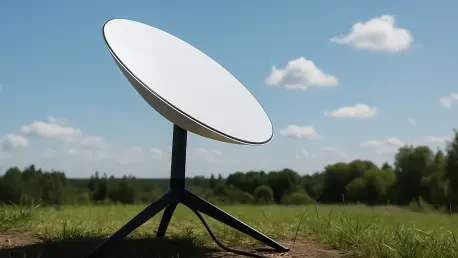Welcome to an insightful conversation with Rupert Marais, our in-house security specialist with deep expertise in endpoint and device security, cybersecurity strategies, and network management. Today, we dive into the rapidly evolving world of satellite communications, focusing on Eutelsat’s remarkable growth in Low Earth Orbit (LEO) services, its competitive edge against major players like Starlink, and the geopolitical dynamics shaping government partnerships. We’ll explore financial milestones, strategic expansions, and the unique challenges of scaling a satellite network in a highly competitive and geopolitically charged landscape.
How has Eutelsat managed to achieve such an impressive 84% increase in LEO revenue to €186.8 million for fiscal 2025?
That 84% surge is a testament to Eutelsat’s strategic focus on meeting a growing demand for reliable, high-speed connectivity in areas where traditional infrastructure falls short. A big part of this comes from our ability to offer tailored LEO solutions that cater to specific market needs, especially for government and enterprise clients. We’ve also ramped up deployment and optimized our operations to ensure better service delivery, which has attracted more customers. It’s about being agile and responsive in a fast-moving sector.
What’s behind the significant 24.1% growth in Government Services revenue to €211 million?
The growth in Government Services revenue is largely driven by the increasing reliance on LEO-enabled solutions for critical communications. Governments are looking for secure, resilient networks, especially in conflict zones or remote regions. Our services have been pivotal in areas like Ukraine, where maintaining connectivity under duress is vital. Additionally, there’s a broader trend of non-US governments seeking alternatives to American providers, and we’ve positioned ourselves as a trusted partner in that space.
Why has video revenue declined by 6.5% to €608 million, and how does this affect Eutelsat’s broader strategy?
The drop in video revenue reflects a global shift away from traditional broadcast services toward streaming and on-demand platforms, which impacts satellite operators like us. While this segment remains a significant part of our portfolio, it’s clear the market is evolving. Our strategy now prioritizes diversification—investing heavily in LEO and data services to offset declines in video. It’s about balancing our legacy strengths with future-focused growth areas.
What factors are fueling government interest in Eutelsat’s LEO services over US-based providers like Starlink?
Geopolitical tensions play a huge role. Many governments, even allies of the US, are wary of over-reliance on American technology due to shifting policies and mixed messaging from recent administrations. There’s a growing desire for sovereign control over critical infrastructure, and as a Paris-based company, Eutelsat offers a viable alternative. Our focus on customized, secure solutions also resonates with governments looking to protect sensitive communications.
Can you share more about Eutelsat’s contributions in Ukraine with LEO-enabled solutions?
In Ukraine, our LEO services have been crucial for maintaining connectivity amidst widespread disruption caused by the conflict. We’ve provided reliable broadband to support both civilian and military communications, ensuring that essential services and coordination efforts aren’t cut off. It’s a real-world example of how satellite technology can make a difference in crisis situations, and it’s strengthened our reputation as a dependable partner in challenging environments.
What specific needs are non-US governments expressing that Eutelsat seems to address more effectively than competitors?
Non-US governments often prioritize data sovereignty and security, wanting assurance that their communications aren’t subject to foreign oversight. We’ve been able to offer solutions that align with those concerns, alongside flexible service models that cater to unique operational needs. Whether it’s for defense, disaster response, or remote governance, our approach is to build trust through transparency and localized support, which sets us apart.
Can you walk us through the €1 billion framework agreement with France’s Armed Forces Ministry for LEO services?
This agreement is a landmark for us, highlighting our growing role in supporting sovereign customers. It involves providing advanced LEO satellite services to enhance the French military’s communication capabilities, ensuring secure and reliable connectivity for operations worldwide. The deal spans multiple years and includes tailored solutions for defense needs. It’s a clear signal of confidence in our technology and our ability to meet stringent military requirements.
How does Eutelsat plan to use the €1.5 billion capital increase to enhance its LEO network?
The €1.5 billion capital increase, bolstered by contributions including from the UK, is a game-changer for our LEO ambitions. The funds are primarily earmarked for expanding our satellite constellation, accelerating the deployment of new spacecraft, and upgrading ground infrastructure. This investment allows us to scale up capacity and coverage, positioning us to better compete in the global market while addressing the urgent need to replace aging satellites in our OneWeb fleet.
What can you tell us about the recent order for 100 additional satellites and the procurement of 340 more for the current constellation?
The order for 100 additional satellites in December 2024, along with the procurement of 340 more for our existing constellation, reflects our commitment to rapid expansion. These satellites will boost our network’s capacity, improve global coverage, and ensure we can meet rising demand. It’s a significant step toward closing the gap with larger competitors, and we’re working closely with manufacturers to get these assets into orbit as efficiently as possible.
What is your forecast for the future of LEO satellite services in the face of intense competition?
I believe LEO satellite services will continue to grow exponentially as the demand for global connectivity skyrockets. Competition will push innovation, driving down costs and improving service quality for end users. For Eutelsat, the focus will be on strategic partnerships and niche markets where security and sovereignty are paramount. While challenges remain, especially in scaling infrastructure, I’m optimistic that we’re on the cusp of a transformative era for satellite communications, with LEO at the forefront.









